Putin the Heinous Strikes at Global Wellbeing
by Brian Czech
When the name “Putin” is uttered—from now until the end of human utterance—the first thing that should come to mind is hundreds of thousands (and counting) of dead and wounded. Putin has turned a verdant, peace-seeking country into a hell-scape of suffering, including starvation. Let’s not overlook the Ukrainian casualties, now or ever.
Now, Putin is taking an even deeper stride into the annals of infamy by orchestrating one of the most despicable episodes of wanton waste in history: his attack on Ukrainian grain stocks and infrastructure. After yesterday’s attacks at Izmail (just across the Danube River from Romania), over 200,000 tons of grain have been destroyed (including 60,000 tons in one night at Odesa). That’s enough to feed nearly a million humans for a year! And that’s not even counting other food stocks that have been hit, such as the 100 tons of peas destroyed at Odesa on July 21.
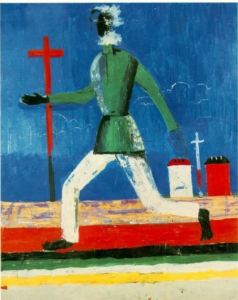
The Running Man, 1932 water color by Kasimir Malevich. Persecution from the east—and starvation—is not new to Ukrainians. (Wikipedia)
Nor does it count the millions of tons of agricultural harvest foregone as a result of Putin’s widespread destruction of Ukraine’s agricultural sector. As Cole Aronson reported for the New York Times, “In 2021, Ukraine produced over 30 million tons of wheat, 9 million tons of barley, and over 40 million tons of corn—high numbers that declined by a third in 2022 and are expected to go down further in 2023.” Yes, the production numbers are plummeting as fast as Putin’s reputation, and whatever is produced faces the grim Russian reaper at the transit ports.
Intentional destruction of such massive stocks of food is a “grave breach” of Article 50 of the Geneva Convention. It is a particularly egregious form of “extensive destruction…not justified by military necessity and carried out unlawfully and wantonly.” Putin is essentially starving not only Ukrainians, but those at the margins of sustenance worldwide, far outweighing the 50 tons of grain he promised last week to six African countries in a cynical attempt to save face. Furthermore, those 50 tons are easily covered by grain stolen from Ukraine in 2022 alone.
But there is still another dot to connect, and it’s a big one as well. It’s a dot surely encompassing you. Practically everyone on Earth is a victim of Putin’s invasion, because his wanton waste of grain is going to be the turbocharger of inflation.
Putin’s Practicality was Greatly Overemphasized
At the Herald, we honed in on Ukranian grain from the moment Putin’s troops assembled on Ukraine’s borders. That was in late February of 2022. Doing so set us apart from the mainstream media, for whom grain was an afterthought. In fact, it seemingly set us apart from all the media, think tanks, and geopolitical pundits in the spring of 2022.[i]
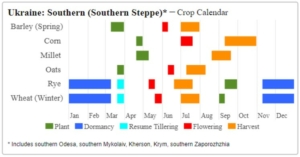
Cultivation schedule for southern Ukraine. (USDA Foreign Agricultural Service)
Since then, several pulses of Ukrainian grain have gone to harvest. Much of it did make it to market in 2022, pursuant to the Black Sea deal brokered by the U.N. and Turkey (and suspended now by Putin). We’ll soon consider what that has meant for the global food supply—and the global money supply.
But first, I must acknowledge a regret from 2022: namely my reference to Putin as “the Practical” in the aforementioned article. The label was not intended as a compliment. To the contrary, it was meant to juxtapose Putin with the so-called “greats” of lore, especially “Peter the Great,” whom Putin emulates. By highlighting the practical nature of agricultural pursuits (the real focus of the article), I intended to portray Putin as down on the ground—down in the dirt as it were—not up on some glorious historical pedestal. It was, perhaps, too nuanced an attempt, especially to show up in a headline.
Furthermore, given Putin’s murderous track record prior to 2022, I should have foreseen that even “practical” would be too generous a label for Putin’s actions in Ukraine. Writing “Putin the Practical” was a bit like writing “Pol Pot the Thorough” or “Hitler the Patriotic.” It was unintentionally euphemistic, and woefully so. I apologize for writing it.
Now, let’s shift gears and consider the primacy of grain to global economic affairs. It will help to revisit the origins of money.
Grain and the Global Money Supply
The Israeli scholar Yuval Noah Harari wrote, “We did not domesticate wheat; wheat domesticated us.” It’s a bit of an exaggeration, because in reality Homo sapiens and the genus Triticum “domesticated” each other for over two millennia during the Neolithic period. People learned to farm while the productivity of wheat (primarily emmer, einkorn and spelt at the time) allowed them to settle onto the land. Domestication of wheat and humans went hand-in-hand.
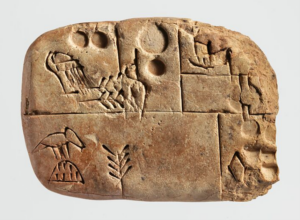
Cuneiform tablet, circa 3000 BCE, accounting for the distribution of barley and emmer (an ancient wheat variety). (Public domain)
Still, Harari’s shibboleth resonates strongly with subscribers to the trophic theory of money. We might even add, “We did not create money; wheat created money,” although it would be more accurate to ascribe the origins of money some 5,000 years ago to barley, not wheat. Barley itself was used as a means of exchange, a store of value, and a unit of account. This practice became so widespread and precise that, when the shekel was finally born circa 2400 BC, it’s weight in silver was balanced to 160 grains of barley.
During the thousands of years it took for Mesopotamian society to transition from commodity money (barley) to silver coinage (shekels), these two forms of money co-existed in a “bi-monetary” system. Yet another first—the first accounting system—arose to document the exchanges of barley and shekels for each other and for other goods and services in the developing economy. Such accounting was recorded on clay tablets in the Sumerian writing called “cuneiform.”
So, if you’ve read about the famous “cuneiform tablets,” you were probably reading about some of the earliest accounting of the earliest monetary exchanges, recorded in one of the earliest forms of writing, all made possible by the earliest, long-lasting and reliable agricultural surplus that freed the hands for the earliest, societal division of labor. That’s a long sentence made more digestible with a simple diagram:
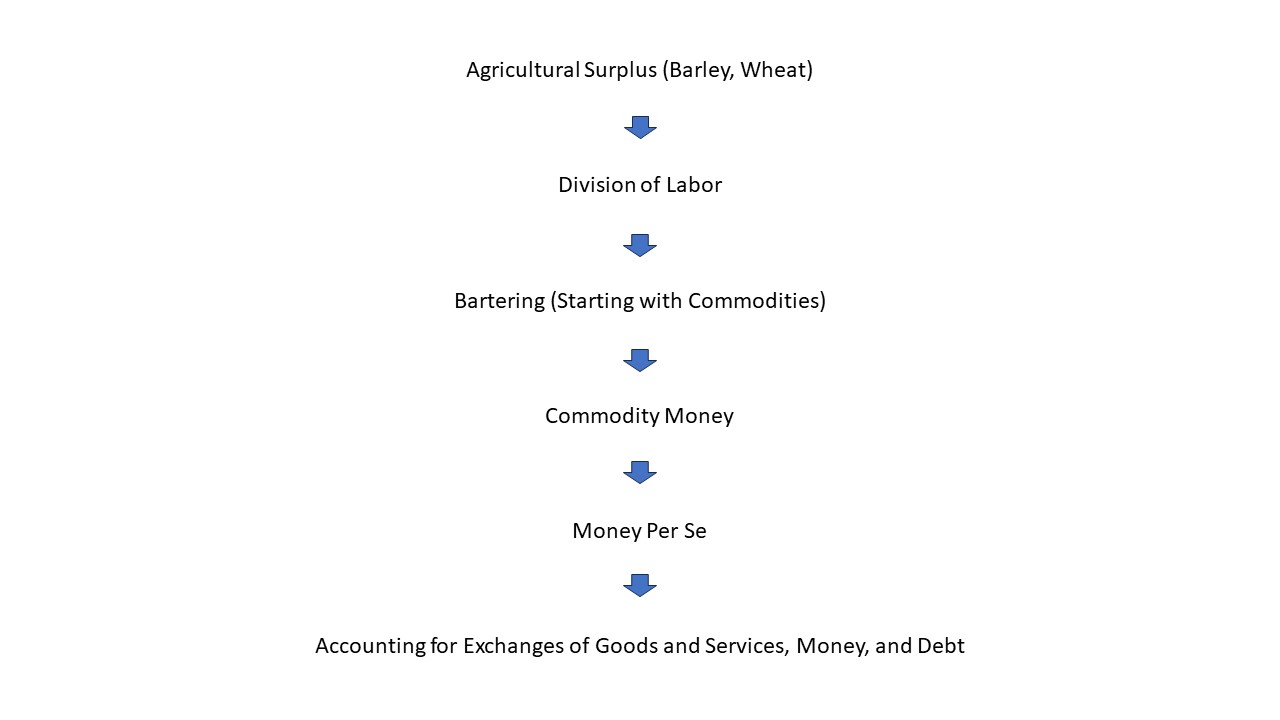
The fundamentals haven’t changed. We have a real economy based on agricultural surplus, and a money supply “authorized” by the amount of agriculture surplus. A lot of surplus warrants a lot of money; little surplus warrants little money.
In other words, the “real” money supply accurately reflects conditions in the real economy. If it doesn’t, we’re in trouble. We’re in the choppy seas of inflation or the stagnant swamp of deflation.
Primer on Inflation
Anything that disrupts the ratio of the money supply to real economic production (which starts at the base with agricultural surplus) is, by definition, causing inflation or deflation. The focus here is on inflation.
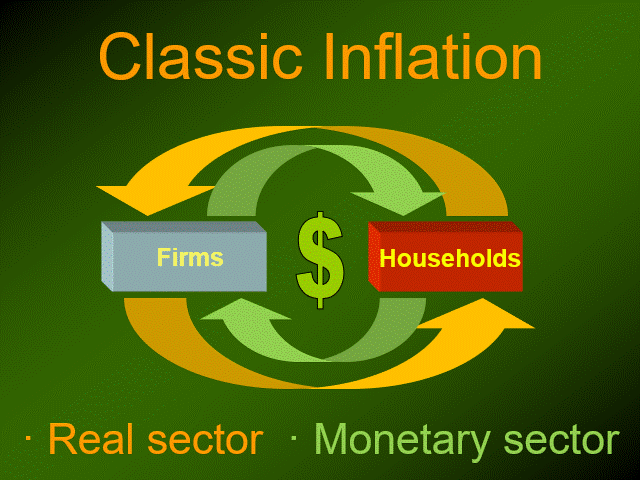
Demand-pull inflation caused by a bloating nominal money supply. (CASSE)
The easiest way to think of inflation is as “too much money chasing too few goods.” In other words, the ratio of the money supply to real economic production (the production of goods and services) has increased. We are talking here of the nominal money supply, not the real supply. Remember, the real supply, by definition, mirrors the level of production in the real economy. If the nominal supply is greater than the real supply, it’s inflated.
This terminology can be confusing, because what “really” exists in the calculations of the Federal Reserve and others who monitor money supplies (including M0, M1, M2 and M3) is nominal money. The nominal money supply has a certain reality, alright, but it’s a reality tied up with and contorted by interest rates, various levels of liquidity among assets, and the forces of inflation and deflation. That’s all the more reason to specify the term “nominal” when talking of money supply figures as reported by the Fed, IMF, etc.
The two main kinds of inflation are “demand-pull” and “cost-push.” Demand-pull inflation happens when demand increases more rapidly than production. “Demand” doesn’t necessarily refer to anything psychological, like the propensity to consume. Remember, demand is measured by economists in monetary terms. So, for example, if the Federal Reserve increases the nominal money supply in the absence of real economic growth, it causes demand-pull inflation.
Cost-push inflation, on the other hand, comes from the real supply side. The closer to the foundation of the economy, the more important the supplies. For example, if there is a timber shortage, lumber prices increase, along with the prices of related raw materials or heavy manufactures that are called upon to fill in the gaps. These higher prices reverberate into the lighter manufacturing sectors as well.
Putin and Inflation
Recalling the trophic theory of money, the very foundation of the economy is agriculture. Without an agricultural surplus, there is no division of labor and therefore no exchanging of goods and services. Money is worthless. When its value has shriveled to nothing, the supply of it is inflated unto infinity.
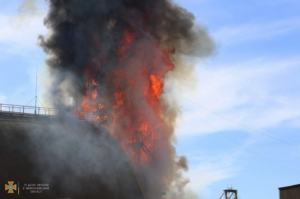
Another portion of the global food supply—and real money—going up in flames at Mykolaiv, Ukraine, August 30, 2022. (war.ukraine.ua)
This side of Armageddon, it’s not all or nothing, of course. If the agricultural surplus simply declines without disappearing entirely, there is still some division of labor and some exchanging of goods and services. Money isn’t worthless, but its value has declined. The supply of it is inflated to some degree.
And that is precisely what Putin is causing. By laying waste to a significant proportion of the global wheat harvest, he is lessening global capacity for division of labor, exchanging of goods and services, and real money supply. He’s causing cost-push inflation, surely more than any one person of the 21st century to this point. In a sense, he is stealing from all of us.
It was a mistake to call Putin “the Practical.” It would be a bigger mistake to overlook the contribution of Ukraine grain to the wellbeing of humankind throughout the world. Meanwhile, Putin is murdering Ukrainians, starving the poor in developing countries, and causing financial distress among the masses of middle-class citizens. He should go down in history as “Putin the Heinous.”
[i] Commenting on an article at the Steady State Herald, Natylie Baldwin (a writer on Russian culture and, more recently, political affairs) even opined, “the idea that Russia wants to take over Ukraine… for some extra agricultural land is ludicrous.”
Brian Czech is CASSE’s Executive Director.



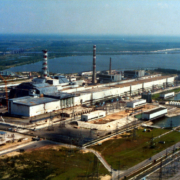

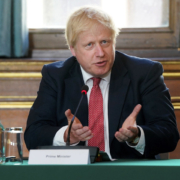
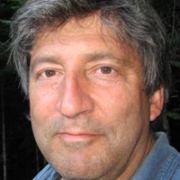


I am very interested in what you think of this analysis.
https://www.youtube.com/watch?v=2q6Usko4x6s
That’s a one-hour video and we’re stretched very thin at CASSE. Can you post the key points here? We’ll try to respond.
Applying for a job at MSNBC, are we?
“When the name “Putin” is uttered—from now until the end of human utterance—the first thing that should come to mind is hundreds of thousands (and counting) of dead and wounded.”
I have that when I hear names like Hunter Biden, Victoria Nuland, Jens Stoltenberg and Petr Poroshenko (to name just a few), who bear a much larger responsibility for the coming about of this conflict. Besides the geopolitical aspects, it’s very much about making profits via fossil fuels and weapons. To do what, you may ask? To grow the US economy, dummy!
One would have thought that people who get the ‘infinite growth’ nonsense, would also have learned from Iraq and Afghanistan, etc, and so on, and so forth.
Yes, we obviously get the “infinite growth nonsense.” But there’s nothing good to be said about the wanton waste of millions of tons of crops. And it doesn’t take a Biden or Stoltenberg fan to recognize Putin as the geopolitical narcissist he is.
When you used the word “dummy” you committed an ad hominem fallacy. Brian is neither a dummy, nor ignorant. You might disagree with his focus on the heinous use of the supply to commit war, which is dead on, nevertheless, but your argument was already invalidated with your personal attack against Brian. Now, I don’t really care about Hunter Biden’s and the other people you mentioned and their alleged role( from you) in bringing about the war in Ukraine. Now, you may want to call me a dummy.
This post brought to you by the CIA. Please, continue to be heavily distracted by overseas boogeymen while your own country falls apart internally due to intransigent wealth inequity, dysfunctional economic systems and disintegrating families. That’s the way we like it.
In the pages of the Steady State Herald you’ll find far more critique of the USA than any other country.
In the hierarchy of environmental destructiveness, the obscene war industry is probably near the top. There is a DANSE MACABRE between the military-industrial complexes of Russia, Nato countries like France and the USA. Raytheon “won” a 1.2 billion $ contract for surface-to-air missiles for Ukraine. (Wars are great for GDP.) We hear words of hatred between the different sides, but secretly Raytheon execs are thanking Putin. That said, even if Putin was a poked bear, he started this round, and he has zero excuse for bombing food supplies. As poet Jacques Prévert wrote, “Quelle connerie la guerre!”
I feel a strong push to weigh in on Brian’s post and all the responses it got. If we accept that Putin is actually destroying the grain as reported( and there’s no reason to seriously doubt this), then Brian is dead-on Putin is indeed heinous. But, this shouldn’t distract us from the fact that war itself is heinous and any careful student of war should know this. What really scares me is that the insane “logic” of Putin’s invasion and the Ukrainian-US/Nato axis response probably constitutes a world war. And, far as I’m concerned it’s not about it’s effect on the value of money that we should worry about. Real, flesh and blood people are dying and suffering and most of our world leaders it would seem have no effective way to think beyond war and the threat of war as an extension of politics. By the way, this goes for all the wars that are now currently raging throughout the world. As for money, I’m afraid, it is the principle political instrument in the world today and until we put real people first instead of positioning for financial power( collectively and individually) backed up by the brutality of war, then we will continue to have more Ukraines. I’m thoroughly disgusted by Man’s humanity towards its own kind and beyond!
I noticed some reports on recent harvests being good in Russia. My guess is that its a strategic play to disrupt the Ukranian harvest, placing a trump card in Russian hands, they may have the food that Africa needs in the months ahead. Putin likely fears the war just dragging on with Russia slowly losing. If he can maximise chaos by disrupting the Ukranian food export while demanding a ransom in the form of a favourable peace settlement using the Russian harvest as the bargaining chip. Let’s just get the fighting stopped, lives saved, lets pause. No one really wins in a fight. In cooperation we win. With time leadership will rollover, cooperation can reestablish, peace and an agreed best way forward envisaged and steps on that journey taken.
RE: The Israeli scholar Yuval Noah Harari
Yuval Harari, affiliated with Schwab’s WEF’s [https://archive.md/vrZGf] and one of WEF’s frontman psychopaths [https://www.bitchute.com/video/Alhj4UwNWp2m], who is sold as an intellectual “genius” by this crazy world is the person who called you and me and all other commoners “useless people” [https://archive.ph/KlOKx] — while millions of those “useless people” have been buying and recommending his books like candy (to learn his “lessons”), serving him very usefully. It’s one proof that most people anywhere are stupid and crazy (while “thinking” they’re intelligent).
“COVID is critical because this is what convinces people to accept, to legitimize, total biometric surveillance.” — Yuval Noah Harari, WEF Forum member [https://archive.md/vrZGf]
While I agree with your statement, US imperialism is a contributive factor in this mess. Without NATO and global capitalism, we would not be in this mess.
We need two fundamental paradigm shifts: abolition of militarism and capitalism… and the United States empire is a fundamental problem in this regard.
As always some good insights from Brian. From reading comments, I think many see the world as either A is good and B is bad, or the reverse. In other words, either Russia is bad and the US is good, or the reverse, Russia is good and the US is bad.
I think the truth involves the concept of “and”, not “or”: both Russia and the US are bad. Was the US invasion of Iraq in 2003 appalling and immoral? Yes! Was the Russian invasion of Ukraine in 2022 appalling and immoral? Yes again!
That said, Putin’s Russia is looking deeply disturbing from a steady stater’s standpoint. While in Finland last summer, I talked to a lot of thoughtful Finns, and they understand Russia on a pretty deep level out of necessity. One Finnish woman, who was fluent in Russian, put it this way:
“There are plenty of good and decent Russians. But Russia as a whole is really a 14th century Mongol society masquerading as a 21st century European one.”
Yikes. This does tend to explain a lot. The political intrigues (often fatal) among the Russian ruling class, the corruption, the reliance on extractive industries, and alas, the constant cultivation of division among neighboring societies and nibbling for more territory.. this is all very familiar from a dark chapter in human history.
Let me clarify that for myself, up until recently I would be classified not as a Russophile but certainly Russia-curious. I enjoyed learning Russian in university, have enjoyed watching Russian news broadcasts (to keep up language skills), and have felt a lot of empathy for post-1991 Russia trying to find its way in the world. In the recent past I made a point to welcome Russian visitors to California in their native language, whenever I’d encounter them. You get the picture.
But now Putin I fear has revived the very worst of Russia’s inner demons. For Putin, destroying food is just another way to break a people who would dare resist, so it’s a no-brainer–screw the planet and the future.
Sigh.